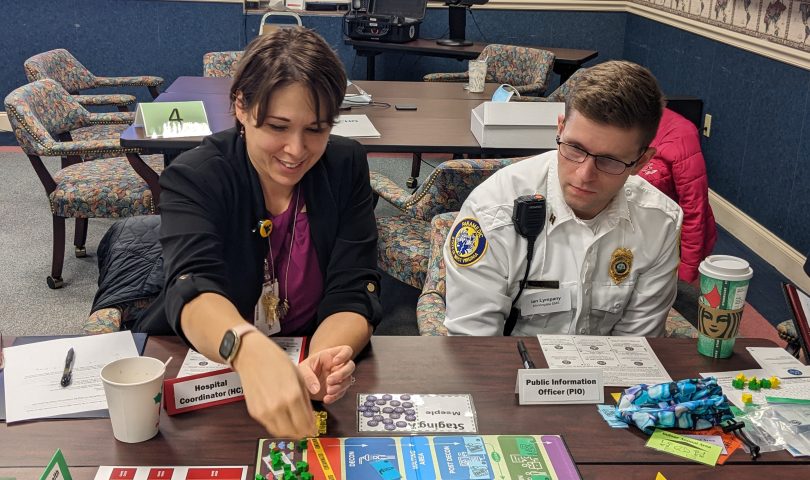Local emergency responders and public health personnel won’t be playing games in the event of a radiation emergency in the area thanks to a newly designed program by the Center for Disease Control and Prevention (CDC) and a collaboration between the Monongalia County Health Department (MCHD) and West Virginia University Medicine.
Representatives from area police, fire and EMS agencies, as well as public health officials, hospital workers, emergency management agencies and other health partners gathered at the Monongalia County Health Department Wednesday morning to participate in the new board game-like training provided by representatives of the CDC, Federal Emergency Management Agency (FEMA) and National Center for Environmental Health (NCEH).
The game called “This is a T.E.S.T,” or Tabletop Exercise Simulation Tool, gives participants, or players, an experience that provides them with the pressures and situations that mimic real-world issues that may arise at a community reception center during a real-life emergency.
Each participant was given a role to play, and each team was given a certain amount of funding and people to be processed. They then worked together to move the public through different areas of the board, which represents a reception center, and process the population effectively while dealing with additional complications like staff fatigue, public anxiety and hazards.
Player roles include public health, emergency management, radiation control, fire and police, communications, hospitals and volunteer coordinators, which is meant to provide a better understanding of the specific roles and responsibilities of different services during a radiation emergency.
“The end goal of the game is to look at your plans, look at how you make decisions that allow you to have a nice, robust response and keep your people safe and also save as many lives as possible and, you know, be effective and not break the system,” said Jamie Moore, the threat preparedness program manager for the MCHD.
Elizabeth Garrasi, director of emergency management for WVU Medicine said the T.E.S.T. training is important from a WVU Medicine perspective because they are designated as a radiation injury treatment network hospital and nationally this is one of the first locations this program has been presented.
“There are hospitals designated all over the country — and we are one of them — to respond and prepare to treat radiation-specific injuries,” Garrasi said. “[This is a T.E.S.T.] is very new and it’s really exciting that this is only the second time they’ve done this in the country and it happens to be here in Morgantown.”
Moore said Wednesday’s training focused specifically on response to radiation incidents like “if a dirty bomb exploded somewhere and there was a lot of people exposed — if there was some type of nuclear explosion — if there was a large-scale power plant or a nuclear accident,” Moore said. “All of those things could contribute to people needing to have community reception before they go to the hospital.”
However, Moore said the exercise will be beneficial to responders not just for radiation, but for all types of public emergencies.
“The great thing about this is the collaboration,” he said. “We have all the partners together working on our problems and it doesn’t matter whether it’s radiation, it doesn’t matter if it’s the next biological incident or any other large-scale natural disaster.
“So building those communications, collaborations, and having relationships with the people in our community that are responsible for doing emergency response — it helps us be better at everything we do.”
Garrasi agreed that working collaboratively with those outside of their individual agencies helps responders understand what each community partner is doing, so if something like a radiation emergency were to happen they have practiced their response and know whose responsibility it is to complete each part of the overall plan.
“It actually helps people be very interactive in this process and I think it’s a really great learning tool,” Garrasi said. “We know everyone learns different ways, but being able to do it together like this and have to actually have some collaboration and work with your teammates will make for a better response for our community.”
TWEET @DominionPostWV




